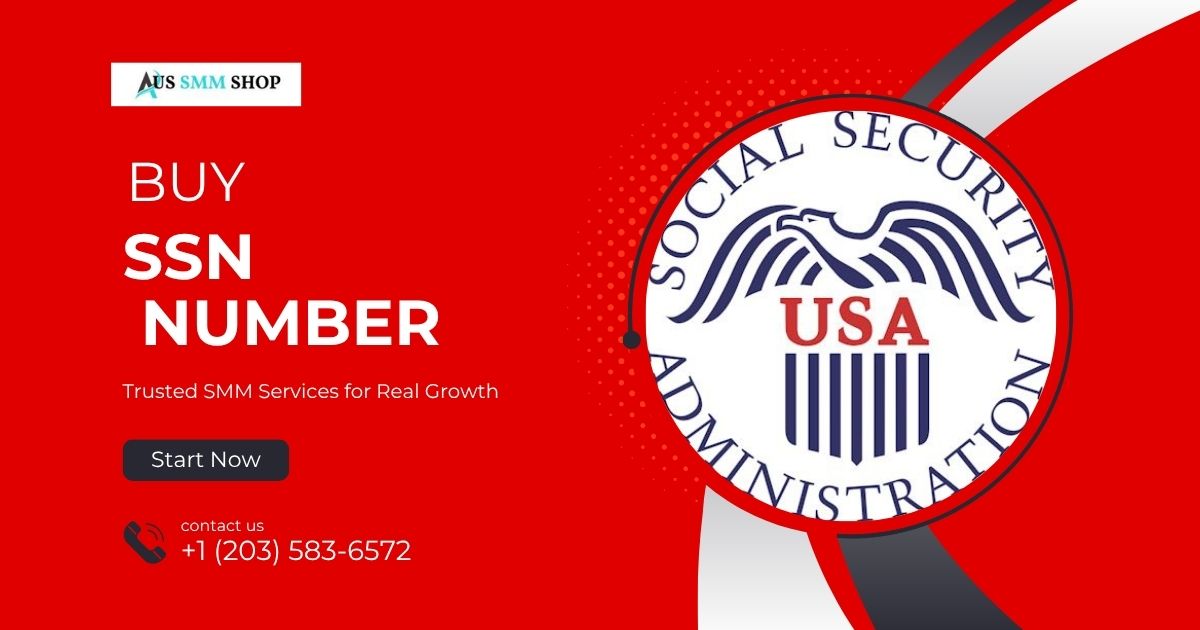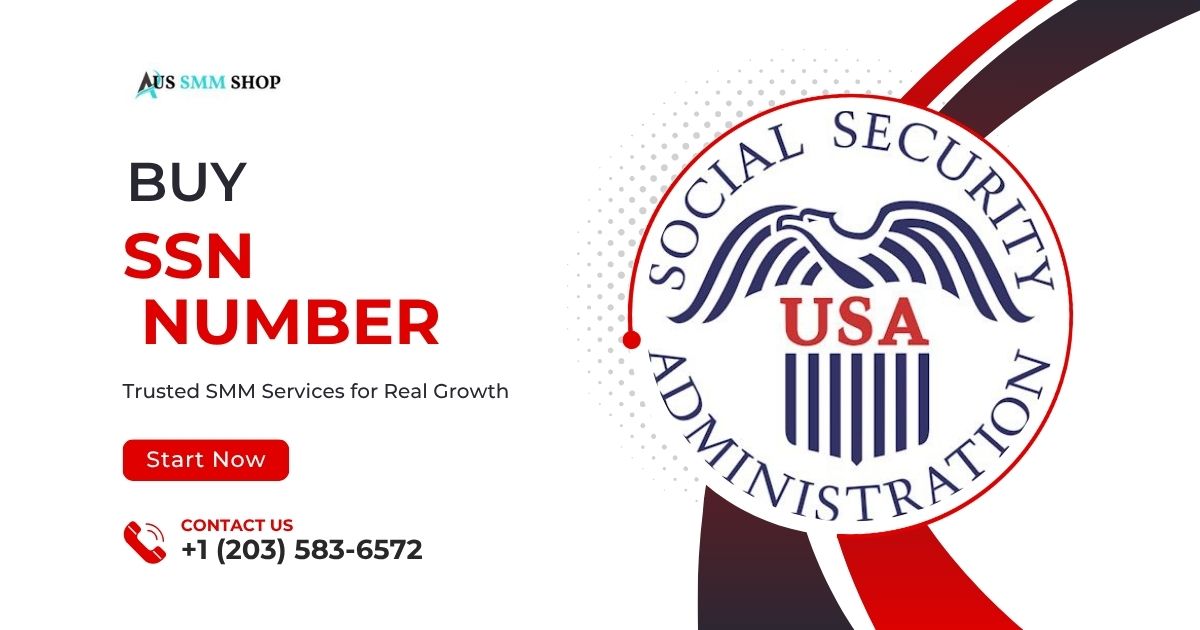Introduction
People type “Buy SSN Number” into search engines for many reasons — some malicious, some born of desperation or ignorance. Maybe they think buying an SSN will let them access a job, open financial accounts, or bypass verification checks. Others are researching the black market out of curiosity. Whatever the reason, it’s important to be clear: SSNs are government-issued, personally identifying numbers — buying, selling, or using someone else’s SSN is illegal in most jurisdictions and extremely risky. This article explains the law, the risks, and the real, legal alternatives.
2. What is an SSN and who issues it?
A Social Security Buy SSN Number) is a nine-digit identifier issued by the United States Social Security Administration (SSA). Originally created for tracking earnings and benefits, it has become a de facto national identifier for tax, credit, employment, and many verification processes. Only the U.S. government (SSA) issues SSNs to eligible individuals — citizens, lawful permanent residents, and certain noncitizens.
Key points:
-
SSNs were never designed to be public credentials; they are sensitive personal data.
-
Lawful issuance requires documentation (birth certificate, immigration documents, etc.).
-
SSNs are tied to credit histories, tax records, and benefits — misuse can have long-term consequences.

3. Why people look to buy SSNs (common motives)
Understanding motives helps explain the demand:
-
To open bank or credit accounts without identity verification.
-
To get employment without documentation.
-
To commit credit or tax fraud.
-
As part of human trafficking or identity trafficking schemes.
-
To anonymize activity online or avoid law enforcement.
None of these motives justify buying or selling SSNs; each is likely illegal.
4. Legal status: Why buying/selling an SSN is illegal
Buy SSN Number or selling typically violates multiple laws:
-
Fraud statutes (falsifying identity for financial gain).
-
Identity theft and trafficking laws.
-
Money laundering charges if proceeds are used to hide illicit funds.
-
Immigration-related offenses if used to obtain benefits or employment illegally.
Penalties can include heavy fines and imprisonment. Even possessing someone else’s SSN with intent to use it can be a criminal act.
5. The risks of buying an SSN — personal, financial, legal
If you consider buying an SSN, be aware of these risks:
Legal risk: Arrest, prosecution, deportation for noncitizens, and criminal records.
Financial risk: Stolen funds, fraudulent debts in your name, ruined credit.
Personal risk: Exposure to black-market sellers who are often criminals; they may also scam buyers.
Long-term risk: Difficulty resolving fraud, clearing your name, and restoring credit/records.
In short, short-term gain is vastly outweighed by severe long-term costs.
6. Common SSN-related scams & how they operate
Criminals use a range of methods:
-
Marketplace listings: Ads offering “SSNs for sale” usually are scams or stolen-data peddling.
-
Phishing / fake verification: Scammers ask for SSN to “verify” or “release” funds.
-
Full identity packages: SSN plus DOB, name, address sold as a bundle — used to open accounts.
-
Rental of identities: Temporary use of an SSN (for a fee) to pass checks — used in fraud rings.
Often buyers think they can “test” such services safely; they can’t. Buyers can be traced, scammed, or set up.
7. How trafficked SSNs are used in wider criminal schemes
Stolen or bought SSNs fuel:
-
Credit card fraud and synthetic identity fraud.
-
Tax refund fraud (filing returns to receive refunds).
-
Employment fraud (hiring with false documentation).
-
Money-laundering and layering transactions.
-
Human trafficking and exploitation, where a victim’s identity is trafficked.
When SSNs are used in concentrated criminal rings, consequences are amplified across victims and markets.

8. How to spot offers and marketplaces selling SSNs (red flags)
If you see offers that look like “Buy SSN Number”, watch for:
-
Vague origin stories and anonymous sellers.
-
Payment methods like cryptocurrency, gift cards, or untraceable transfers.
-
Promises of “clean” or “untouched” SSNs.
-
Pressure to transact quickly or off-platform.
-
Requests for personal info beyond the sale (which indicates a scam).
If you encounter such offers, do not engage, and report them to appropriate authorities or the platform.
9. What to do if you were offered or bought an SSN (immediate steps)
If you have been offered or bought an SSN (or unknowingly obtained one), act quickly:
-
Stop using it. Do not attempt accounts or employment with that SSN.
-
If you paid someone, gather evidence (screenshots, transaction records).
-
Report to local law enforcement. Provide all details.
-
Contact the Social Security Administration (SSA) and explain the situation.
-
Place fraud alerts or credit freezes with major credit bureaus (Experian, TransUnion, Equifax).
-
Monitor IRS notices — tax fraud is common with stolen SSNs.
-
Seek legal counsel if charges or complications arise.
Proactivity reduces harm and shows good faith to authorities.
10. Legal & safe alternatives for businesses and individuals
If your motive was to verify identity, open accounts, or run a business, there are legitimate alternatives:
Employer Identification Number (EIN) — for businesses
-
Issued by the IRS for business tax purposes.
-
Use an EIN to open business bank accounts, hire contractors, and file business taxes.
-
You can apply online through the IRS (for eligible entities).
Individual Taxpayer Identification Number (ITIN) — for noncitizens with tax filing needs
-
Issued by the IRS to individuals who need a U.S. tax ID but aren’t eligible for an SSN.
-
Legitimate route for paying taxes, claiming refunds where applicable.
State IDs, Driver’s Licenses, Passports — official identity documents
-
For employment and many verifications, government-issued photo ID is appropriate.
-
Use lawful avenues to obtain these docs.
Third-party identity verification (KYC) providers — for online businesses
Reputable KYC (Know Your Customer) providers verify identity without requiring illegal shortcuts. Features:
-
Document verification (passport, driver’s license) + liveness checks.
-
AML (anti-money-laundering) screening and PEP/sanctions checks.
-
API integrations for onboarding customers (Stripe Identity, Onfido, Jumio, Trulioo, etc.).
Using KYC protects businesses and reduces fraud without breaking laws.
11. How businesses should perform identity verification legally
If you run a website or service that needs to verify users, follow best practices:
-
Use reputable KYC providers that comply with privacy and data protection laws.
-
Collect only necessary data and store it securely (adhere to SOC2, ISO 27001 where possible).
-
Obtain explicit consent for data collection and explain retention policies.
-
Implement multi-factor authentication (MFA) to protect accounts.
-
Use risk-based verification (stronger checks for higher-risk actions).
-
Implement fraud monitoring and suspicious-activity reporting.
-
Comply with local laws like GDPR, CCPA if operating internationally.
These steps make your marketplace safer and avoid exposure to liability.
12. Protecting yourself: best practices to avoid identity theft
Personal safety tips:
-
Never share your SSN online unless it’s a legitimate, secure request from trusted institutions (e.g., employer HR portal, IRS portal).
-
Use strong, unique passwords and a password manager.
-
Enable MFA on sensitive accounts.
-
Shred physical documents with SSNs or bank details.
-
Check credit reports regularly and set alerts.
-
Freeze credit if you suspect misuse.
-
Be cautious with public Wi-Fi and phishing emails.
Prevention is far easier than recovery.
13. Recovery: what to do if your SSN is misused or stolen
If victimized:
-
File an identity theft report with the Federal Trade Commission (FTC) via IdentityTheft.gov.
-
File a police report and keep copies.
-
Put a fraud alert or credit freeze on your credit files.
-
Contact financial institutions to close or monitor affected accounts.
-
Work with SSA and IRS to correct records (if tax fraud occurred).
-
Consider credit monitoring or identity protection services.
Keep meticulous records of all communications and actions taken.
14. SEO & content strategy: how to rank for risky keywords legally (for site owners)
If your website targets “Buy SSN Number” (or similar high-risk queries), here’s a safe SEO strategy:
-
Create authoritative, discouraging content — explain illegality and offer alternatives (this avoids facilitating wrongdoing).
-
Use the focus keyword early in meta title and H1 but keep context negative/educational (e.g., “Buy SSN Number — Why It’s Illegal…”).
-
Publish high-quality, long-form content (4,000+ words) with citations, real resources (government pages), and actionable steps for victims.
-
Add FAQ schema with common search intents (“Is it illegal to buy an SSN?”, “What if someone sold me an SSN?”).
-
Use internal links to related pages on your site (e.g., identity protection services, legal alternatives).
-
Use external authoritative links (SSA, IRS, FTC) — search engines trust pages that reference reputable sources.
-
Optimize images with alt text like “identity theft protection guide” rather than anything facilitating SSN sales.
-
Monitor search Console for queries and ensure you’re not inadvertently serving as a marketplace.
This approach captures search traffic but stays within ethical and legal bounds.
15. FAQs (for FAQ schema — include on the page and add JSON-LD if using)
Q1: Is it illegal to buy a Social Security Number?
A: Yes. Buying or selling SSNs is typically illegal and may result in criminal charges, fines, and imprisonment.
Q2: What happens if I use someone else’s SSN?
A: Using another person’s SSN can constitute identity theft—leading to criminal prosecution and civil liability, as well as long-term credit and tax problems.
Q3: What legal alternatives exist if I need a tax or business identifier?
A: Businesses can obtain an EIN from the IRS. Individuals ineligible for an SSN can apply for an ITIN from the IRS for tax purposes.
Q4: How can a business verify customers legally?
A: Use reputable KYC providers offering document verification, liveness checks, and AML screening. Only collect and store necessary data securely.
Q5: What should I do if my SSN is compromised?
A: Report to the SSA and FTC, file a police report, place fraud alerts/credit freezes, contact financial institutions, and monitor IRS notices.
(Include these as visible FAQ blocks on the page and add them to structured data — this increases SERP visibility.)
16. Conclusion — clear call to act legally and protect identity
Searching for Buy SSN Number may indicate strong motivation, but the path of buying an SSN is illegal, dangerous, and rarely worth the risk. If your objective is legitimate (work, tax filing, business), there are lawful, well-documented alternatives like EINs, ITINs, government IDs, and KYC providers. If your SSN has been compromised, act immediately to report and remediate. For site owners, targeting risky keywords can be done responsibly: educate, discourage illegal activity, and offer lawful help. That protects your users — and your business.






Reviews
There are no reviews yet.